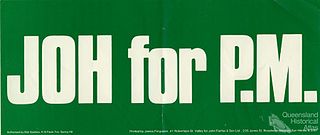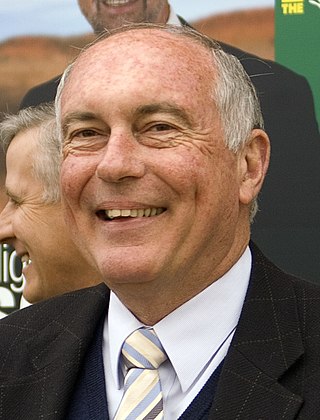Related Research Articles

Sir Johannes Bjelke-Petersen was an Australian politician. He was the longest-serving premier of Queensland,holding office from 1968 to 1987 as state leader of the National Party.

The Joh for Canberra campaign,initially known as the Joh for PM campaign,was an attempt by Queensland National Party premier Sir Joh Bjelke-Petersen to become Prime Minister of Australia. The campaign was announced in January 1987 and drew substantial support from Queensland businessmen and some conservative politicians. The campaign caused a split in the federal Coalition. It did not attract widespread support and collapsed in June 1987. The Australian Labor Party,led by Bob Hawke,went on to win the 1987 federal election with an increased majority,gaining its highest-ever number of seats. Bjelke-Petersen came under increasing scrutiny as the Fitzgerald Inquiry gained traction,and was forced out of politics altogether in December 1987.

Warren Errol Truss is a former Australian politician who served as the 16th deputy prime minister of Australia and the minister for Infrastructure and Regional Development in the Abbott government and the Turnbull government. Truss served as the federal leader of the National Party of Australia between 2007 and 11 February 2016 when he announced his decision to retire and not contest the 2016 federal election. He was the member of the House of Representatives for Wide Bay from the 1990 election until his retirement in May 2016. Following the merger of the Queensland branches of the Nationals and Liberals,Truss was re-elected in 2010 for the Liberal National Party.
Robert Edward Borbidge is a former Australian politician who served as the 35th Premier of Queensland from 1996 to 1998. He was the leader of the Queensland branch of the National Party,and was the last member of that party to serve as premier. His term as premier was contemporaneous with the rise of the One Nation Party of Pauline Hanson,which would see him lose office within two years.
Theo Russell Cooper is an Australian retired National Party politician. He was Premier of Queensland for a period of 73 days,from 25 September 1989 to 7 December 1989. His loss at the state election of 1989 ended 32 years of continuous National Party rule over Queensland.

Michael John Ahern was an Australian National Party politician who was Premier of Queensland from December 1987 to September 1989. After a long career in the government of Sir Joh Bjelke-Petersen,Ahern became his successor amid the controversy caused by the Fitzgerald Inquiry into official corruption. Ahern's consensus style and political moderation contrasted strongly with Bjelke-Petersen's leadership,but he could not escape the division and strife caused by his predecessor's downfall.

The 1989 Queensland state election was held in the Australian state of Queensland on 2 December 1989 to elect the 89 members of the state's Legislative Assembly. This was the first election following the downfall of eight-term premier Sir Joh Bjelke-Petersen at the end of 1987.

The 1987 Australian federal election was held in Australia on 11 July 1987,following the granting of a double dissolution on 5 June by the Governor-General Sir Ninian Stephen. Consequently,all 148 seats in the House of Representatives as well as all 76 seats in the Senate were up for election. The incumbent Australian Labor Party,led by Prime Minister Bob Hawke,defeated the opposition Liberal Party of Australia,led by John Howard and the National Party of Australia led by Ian Sinclair. This was the first,and to date only,time the Labor Party won a third consecutive election.
This is a list of members of the 44th Legislative Assembly of Queensland from 1983 to 1986,as elected at the 1983 state election held on 22 October 1983.

Elections were held in the Australian state of Queensland on 1 November 1986 to elect the 89 members of the state's Legislative Assembly. It followed a redistribution which increased the number of seats in the Assembly from 82 to 89.

Elections were held in the Australian state of Queensland on 22 October 1983 to elect the 82 members of the state's Legislative Assembly.
Donald Frederick Lane was a Minister of Transport in the Bjelke-Petersen state of Queensland's coalition government. A former policeman in the Special Branch,in 1971 he was elected as the Liberal member for Merthyr,an electorate which included the Fortitude Valley where a lot of the then illegal brothels and casinos were located. During his time with the Police,he had gotten to know Jack Herbert the Chief Organiser of The Joke,and the "Rat Pack" of Terry Lewis,Tony Murphy and Glenn Hallahan well. Following the 1983 Queensland state election he switched to the National Party,providing it with an outright majority,and was rewarded with a ministry. He went on to lead the National Party's submission to the Electoral Commission to more effectively gerrymander and malapportion seats to increase National Party control. It was revealed in the Fitzgerald Inquiry,that Lane had significant unexplained income,and was alleged by Jack Herbert to have taken bribes. Lane did not admit to taking bribes,instead he admitted to abusing Ministerial expenses and claimed a lot of other Ministers had done the same. In the end Lane and three other Bjelke-Petersen ministers were tried in the District Court and sentenced to twelve months imprisonment for falsifying their expense accounts.

William Angus Manson Gunn AM was an Australian politician who represented the Queensland Legislative Assembly seat of Somerset from 1972 until 1992. A member of the National Party,he also served as a Minister and Deputy Premier in various Queensland administrations during the 1980s,and was instrumental in establishing the Fitzgerald Inquiry.
Terrence Anthony White is an Australian pharmacist,businessman,and former politician. White achieved notoriety when,as Queensland state leader of the Liberal Party he terminated the longstanding coalition agreement between the Liberal Party and the National Party of Joh Bjelke-Petersen. In the ensuing election,the Liberals were badly defeated,and White was replaced as party leader. After leaving politics,he established TerryWhite Chemmart,a nationwide pharmacy franchise,and became a widely respected businessman.
The Ginger group,in Queensland politics was a group of Liberal Party MLAs during the 1960s,1970s and 1980s,who despite nominally being a part of the government,were opposed to some of the policies of their senior coalition partner,the National Party. Initially a small informal grouping within the Liberal Party,the group came to wield greater and greater power within the Liberal partyroom,culminating in Terry White's successful leadership challenge in 1983,and the party's subsequent defeat and loss of influence at the 1983 election.
Colin Charles Lamont was an Australian politician. He was a Liberal Party member of the Legislative Assembly of Queensland from 1974 until 1977,representing the electorate of South Brisbane.
Guelfi Paul Scassola was an Australian politician. He was a Liberal Party member of the Legislative Assembly of Queensland from 1977 until 1983,representing the electorate of Mount Gravatt.
Charles Robert Porter was a British born Australian politician,author,playwright and broadcaster. He was the Liberal member for the Electoral District of Toowong in the Legislative Assembly of the Australian state of Queensland from 1966,and the Minister for Aboriginal and Island Affairs from 1977. Before his parliamentary career,Porter engaged in a career in radio and broadcasting,along with other creative pursuits.

The National Party of Australia –Queensland (NPA-Q),commonly known as the Queensland Nationals,National Party of Queensland or simply the Nationals,was the Queensland branch of the National Party of Australia (NPA) until 2008. Prior to 1974,it was known as the Country Party. The party was disestablished in 2008,when it merged with the Queensland division of the Liberal Party of Australia to form the Liberal National Party of Queensland (LNP).

The Bjelke-Petersen Ministry was a ministry of the Government of Queensland and was led by Premier Joh Bjelke-Petersen,who led the Country Party and its successor,the National Party. It succeeded the Chalk Ministry on 8 August 1968 as part of a series of events following the death of former Premier Jack Pizzey on 31 July. It was succeeded by the Ahern Ministry on 1 December 1987 following Bjelke-Petersen's resignation as Premier.
References
- 1 2 3 4 5 6 7 8 "Record of Proceedings" (PDF). Queensland Parliament. 1 December 2016. pp. 4819–4824. Archived from the original (PDF) on 29 April 2017. Retrieved 29 April 2017.
- ↑ "Former Members". Parliament of Queensland. 2015. Retrieved 7 February 2015.
- ↑ Waterson, D.B. Biographical register of the Queensland Parliament, 1930-1980 Canberra: ANU Press (1982)